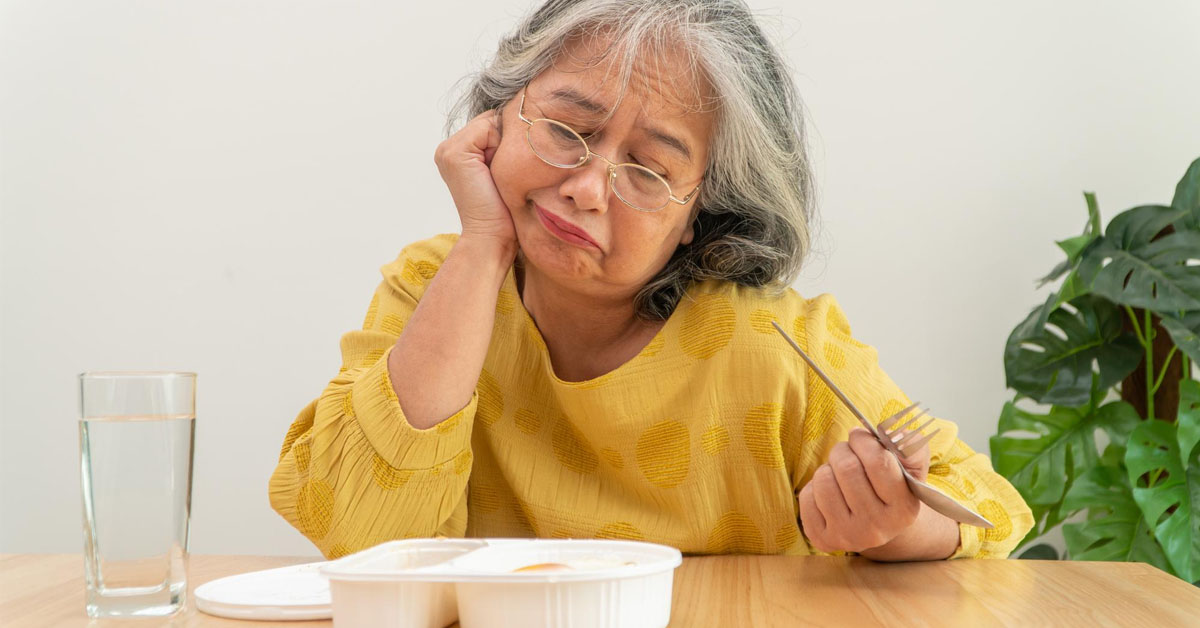As our loved ones age, we may notice a sudden or gradual reduction in their food intake. While this can be a normal part of aging, it is essential to understand the underlying causes to ensure they receive the necessary care. Reduced appetite in the elderly can result from various factors, ranging from common age-related changes to more serious health concerns. This article delves into these causes and highlights the importance of proper assessment and intervention.
Part 1: Common Causes of Reduced Appetite
Changes in Appetite
As we get older, hormonal shifts and alterations in the digestive system can lead to a natural decline in appetite. This reduced hunger can make eating less appealing, leading to decreased food intake.

Dental Issues
Dental problems, such as pain or difficulty chewing due to poorly fitting dentures, can make eating uncomfortable. These challenges may cause the elderly to eat smaller portions or avoid certain foods altogether.

Social and Psychological Factors
Loneliness and social isolation can significantly impact an elderly person’s desire to eat. Without the company of others, meals may feel less enjoyable, and the motivation to prepare or consume food may diminish.

Part 2: More Serious Causes to Consider
While the above factors are common, it is crucial to be vigilant about more severe underlying causes that could affect an elderly person’s appetite. These include:
Chronic Health Conditions
Conditions like diabetes, heart disease, and cancer can directly impact appetite and digestion. Treatments for these conditions, such as chemotherapy, may also lead to side effects like nausea or altered taste, furthering reducing food intake.
Medications
Certain medications frequently prescribed to older adults can affect appetite, cause nausea, or alter taste perception. Drugs for hypertension, depression, or chronic pain are common culprits.
Severe Chronic Illnesses
Advanced stages of diseases such as cancer, heart failure, or kidney disease can severely reduce appetite and disrupt nutrient absorption, leading to malnutrition.
Mental Health Issues
Depression, anxiety, and other mental health concerns can drastically reduce interest in food, further complicating the nutritional well-being of the elderly.
Cognitive Decline
Dementia and cognitive impairments can cause confusion about eating, forgetfulness around mealtimes, or even an inability to recognize hunger signals, leading to reduced food intake.
Gastrointestinal Disorders
Serious digestive issues, including gastrointestinal cancers or chronic gastritis, can cause significant discomfort, nausea, and vomiting, severely impacting appetite and food intake.
Part 3: The Importance of Medical Evaluation
Given the complexity of these potential causes, it is vital to consult a healthcare provider when there is a noticeable reduction in an elderly person’s appetite. The first step is to rule out any sinister causes through comprehensive medical evaluations, including blood tests and physical examinations. If these assessments show no signs of severe illness, the reduced appetite may be linked to psychological or social factors.
Part 4: Holistic Approaches to Addressing Reduced Appetite
Once serious health issues have been ruled out, focusing on the elderly person’s social and psychological well-being can help stimulate appetite. Encouraging social interaction, engaging in activities that bring joy, and addressing minor issues like dental discomfort are all effective ways to improve food intake. Tailoring meals to their preferences and providing companionship during meals can also make eating a more enjoyable experience.
Expert Insights: Dr. Goh’s Advice on Addressing Sudden Loss of Appetite
For more explanation on how to identify the cause of loss of appetite, listen to Dr. Goh’s expert advice in the audio clip below.
Conclusion
Understanding the causes behind reduced appetite in the elderly is crucial for providing the right care. Whether the issue is related to aging, dental problems, or more severe health conditions, early identification and intervention are key. A holistic approach that includes medical, nutritional, and social support can help ensure that elderly individuals maintain a healthy diet and quality of life.
Important Note:
The information provided in this article is based on general advice and is not intended to replace professional medical consultation. Every individual’s situation is unique, and what works for one person may not be suitable for another. We strongly encourage readers to visit their General Practitioner (GP) or a qualified healthcare provided for personalized advice and a thorough evaluation if they or their loved ones experience a sudden loss of appetite or any other health concerns.




